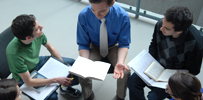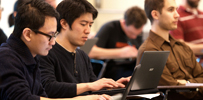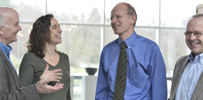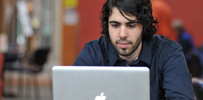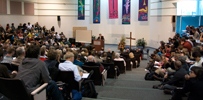Regent’s Unsung Heroes: David Paul, Sharing the Blessing

Fall 2022 is just around the corner! As we welcome faculty and students back to class, we’re also celebrating the staff members whose hard work brings teachers and learners together. This month, we’re delighted to introduce a few of the unsung heroes working behind the scenes to keep Regent open, accessible, and hospitable this Fall.
Since Covid-19 first started disrupting classes in March 2020, Audio-Visual Coordinator David Paul has been at the heart of Regent’s response. This year, his work is making Regent’s hybrid courses accessible to students who can’t be here in person.
David, how would you describe your role?
I see my role as an enabler. My Regent education was a blessing. I received it, and now I get to use my skills to enable the transfer of that blessing to others—especially to those who aren’t able to attend classes in person. I consider this a privilege, because I know the students are receiving something unique, something that will benefit them and that they can pass along to benefit their families, their professions, their cultures. In doing this role, I get to see how the blessing continues.
What does your work look like on a day-to-day basis?
The name tag on my office door says “Hybrid Command Centre”—that’s where I monitor all the classes and other events that are happening live online. From there, my job is like air traffic control. There are flights landing and taking off all the time, but there are lots of factors to make sure that all happens smoothly. You’ve got to be on your toes, because you can’t just say, “too bad, no internet, we have to cancel a class.”
How would you describe Regent’s approach to hybrid classes? What kinds of considerations go into making a course available for both in-person and online students?
We have worked very, very hard to give students the best experience possible. Education at Regent is not just about a transfer of information. If it were, that would be an easy-peasy job: spend a bit of money on good software, have the professors speak, and that’s it. But I think we’re doing more than that. We’re doing our best to make sure that formation is happening.
This is where my role comes into play. I do my best to know the professors, their personalities, and their teaching styles. I know the software and platforms. And I know what it’s like to be on the receiving end of this education. So if I’m thinking about a particular class, I’m thinking about the professor’s teaching and how that relates to their environment. You can’t throw everyone in the chapel just because it’s already set up. I make observations and try to get professors into the classrooms that work best for them. All these things make a difference for students and their formation.
When we set up hybrid classrooms, we spend a lot of time researching and making sure we buy the right equipment. Our approach has never been, “We have some money, let’s buy a new microphone.” Our approach has been to ask, “What would suit this environment? Does this equipment serve the purpose of this kind of education? Does it serve the story we’re telling? Will this edify students’ lives?”
What do you find most meaningful about the work you do?
I’ll tell a little story. In 2014, my second Christmas in North America, I went with friends to a small town in Alberta. We went to a Christmas Eve service, and I started chatting with the person next to me, who was from New Zealand. In the course of five or six minutes, I mentioned I was working with Regent Audio, and he said, “Oh! I bought something from you guys!” And I remembered working on the very product he mentioned.
There we were, from New Zealand and India, in this little church in the middle of nowhere, and something I’d done in Vancouver had benefited him. There, at the start of my time at Regent, I learned that this place leaves a lasting impression. What I do here leaves a lasting impression.
You know, I think about the people working at Regent Audio in past decades. People still buy their products—not because of the people editing it, but because of the lecture. For example, Gordon Fee’s lecture about Paul. Someone wants to hear Gordon Fee talk about Paul, so they download it. It looks like the transaction is between Gordon Fee and the customer. But, boy, there are a lot of people in between!
These middle people, their names may never be known. But they’ve done their job. They’ve helped carry the story forward: taking what Gordon Fee said and getting it to the student. Their work made that movement possible. Their work—which is also my work—makes it possible for the story to continue, for the story to be alive. And it’s a privilege to be able to do this work.
